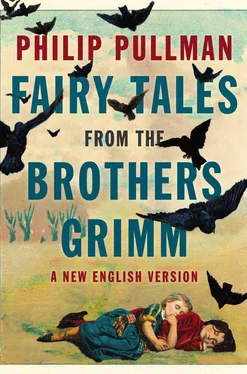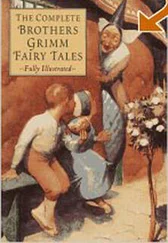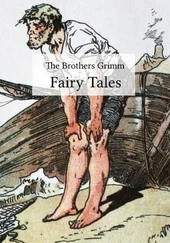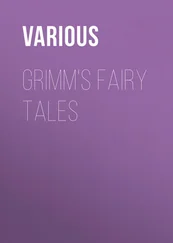And the old woman hurried off down a dark path before the girl could say another word.
But she said in her heart: ‘I can do it! I know I can do it! I’ll redeem my brothers, see if I don’t.’
She chose a tall tree and climbed up high among the branches, where she sat spinning some thread, and thinking: ‘Don’t speak! Don’t laugh!’
Now it happened that sometimes a king came hunting in that part of the forest. This king had a favourite greyhound, and as they were making their way along a path the hound suddenly ran to a tree and started barking and jumping up at it. The king followed, and when he saw the princess with the gold star on her forehead, he was so struck by her beauty that he fell in love at once. He called up and asked if she would be his wife.
She didn’t say a word, but she nodded, and he knew she’d understood. He climbed up the tree to help her down, put her on his horse, and they went home together.
The wedding was celebrated with great joy and festivity, but people remarked on the bride’s strange silence. Not only did she not speak, she didn’t laugh either.
However, the marriage was a happy one. But after they had spent some years together, the king’s mother began to speak evil of the young queen. She would say to the king, ‘That wretch you brought home with you — she’s no better than a common beggar. Who can tell what wicked things she’s thinking of? And she might be a mute, but any decent person can laugh from time to time. Anyone who doesn’t laugh has something on their conscience, you can be sure of that.’
At first the king didn’t want to listen to that sort of talk, but as time went by the old woman kept on and on, inventing all kinds of evil things to accuse the young queen of, and the king finally began to believe she must be right. The young queen was arraigned before a court packed with the old woman’s favourites, and they didn’t hesitate to sentence her to death.
A great fire was built in the courtyard where she was to be burned to death. The king watched from an upstairs window, tears flowing down his cheeks, for he still loved her dearly. She was tied to the stake, and the red fire was already rising higher and licking at her dress, when the last moment of the seven years passed.
And then twelve ravens flew down, the sound of their wingbeats filling the courtyard. As soon as their feet touched the ground they became her brothers again, and they rushed to the fire, kicking the burning logs this way and that, and untied their sister’s bonds and brushed off the sparks that were beginning to set her dress alight. They kissed and embraced her, carrying her away from the stake.
And as for the young queen, she was laughing and talking as well as ever. The king was amazed. Now that she could speak, she told him why she had been silent so long. He rejoiced to hear she was innocent of all the terrible things his mother had accused her of.
But then it was the old woman’s turn to be accused, and the court had no difficulty in finding her guilty. She was put into a barrel filled with poisonous snakes and boiling oil, and she didn’t last long after that.
* * *
Tale type:ATU 451, ‘The Maiden Who Seeks Her Brothers’
Source:a story told to the Grimm brothers by Julia and Charlotte Ramus
Similar stories:Alexander Afanasyev: ‘The Magic Swan Geese’ ( Russian Fairy Tales ); Katharine M. Briggs: ‘The Seven Brothers’ ( Folk Tales of Britain ); Italo Calvino: ‘The Calf with the Golden Horns’, ‘The Twelve Oxen’ ( Italian Folktales ); Jacob and Wilhelm Grimm: ‘The Seven Ravens’ ( Children’s and Household Tales )
This tale has many cousins and it’s easy to see why. The charm of the chorus of nearly identical brothers, who are turned into birds; of the sister who unwittingly causes the transformation, and who is placed under a nearly impossible prohibition; of her fidelity and courage, and the terrible fate that seems about to engulf her, and the perfect timing of the brothers’ return and the sound of their wingbeats — it all makes a very pretty story.
The version in Grimm deals clumsily with the matter of the magic cottage and the lilies. I introduce the old woman earlier than she appears in the original, for the sake of timing.
One interesting detail is that the king’s mother is first called Mutter and then, a few sentences later, Stiefmutter , as if correcting an earlier slip of the tongue. Which is she, mother or stepmother? This is not the only time this question will come up. The storyteller has to decide; no one else can.
SIX
LITTLE BROTHER AND LITTLE SISTER
Little Brother took Little Sister by the hand.
‘Listen,’ he whispered, ‘since our mother died we haven’t been happy for a single hour. The stepmother beats us every day, and her one-eyed daughter kicks us away whenever we try to go near her. What’s more, stale bread crusts are all we get to eat. The dog under the table eats better than we do; he often gets a tasty bit of meat. God knows, if our mother could see how we have to live! Let’s go away together into the wide world. We couldn’t live any worse if we were tramps.’
Little Sister nodded, because every word her brother said was true.
They waited till their stepmother was having a nap, and then they left the house, closing the door very quietly behind them, and they walked the whole day over meadows and fields, over pasture land and stony land. It began to rain, and Little Sister said, ‘God’s crying now, and our hearts are crying with him.’
In the evening they came to the forest. They were so exhausted, so hungry and sorrowful, and so frightened of the dark that was gathering around them, that all they could do was climb into a hollow tree and fall asleep.
When they awoke in the morning, the sun was already shining down into their tree.
Little Brother said, ‘Sister, wake up! It’s warm and sunny and I’m thirsty. I think I can hear a spring — come and let’s drink!’
Little Sister woke up too, and hand in hand they went to search for the spring they could hear among the trees.
Now the trouble was that their stepmother was a witch. She could see through her eyelids, and she was watching the children all the time as they tiptoed out of the house. She crept after them, as witches do, flattening herself close to the ground, and she put a spell on all the springs in the forest before creeping back to the house.
Soon Little Brother and Little Sister found the spring they’d heard, and saw the fresh cold water glistening as it ran over the stones. It looked so inviting that they both knelt down to drink.
But Little Sister had learned how to listen to what running water was saying, and she could hear the spring talking. Just as little brother was raising his cupped hands to his dry mouth she cried out, ‘Don’t drink! The spring is bewitched. Anyone who drinks from it will become a tiger. Put it down, put it down! You’ll tear me to pieces!’
Little Brother did as she said, thirsty as he was. They walked on and soon found another spring. This time she knelt first and put her head close to the water.
‘No, not this one either!’ she said. ‘It says, “Whoever drinks from me will become a wolf.” I think the stepmother must have put a spell on it.’
‘But I’m so thirsty!’ he said.
‘If you become a wolf, you’ll eat me up at once.’
‘I promise I won’t!’
‘Wolves don’t remember promises. There must be a spring she hasn’t bewitched. Let’s keep looking.’
It wasn’t long before they found a third spring. This time Little Sister bent over and listened carefully and heard the water say, ‘Whoever drinks me will be turned into a deer. Whoever drinks me will be turned into a deer.’
Читать дальше












